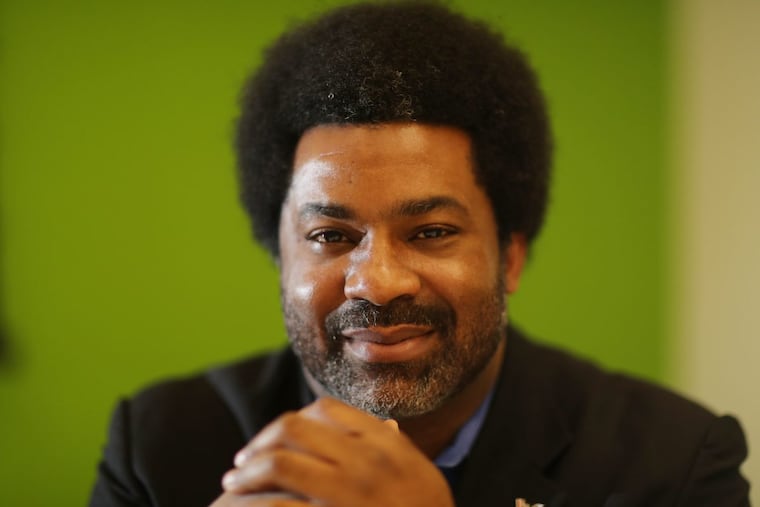Why having more black male teachers matters
"In the past, people would say, 'It would be nice to have more black men in the classroom,' but now there's research, and there's a sense of urgency around the issues," said Sharif El-Mekki, principal of Mastery Charter School-Shoemaker.

On Friday, Nate Bowling will board a plane to head to Philadelphia, a hot spot for a national conversation on an issue of growing prominence in education.
"We can't continue to go on having a school system in which the people in the front of the room don't match even remotely the rest of the people in the room," said Bowling, a Washington state teacher of the year and veteran Tacoma social studies teacher.
Nationally, just 2 percent of the nation's teachers are black men. In the Philadelphia School District, where 54 percent of students are black, the numbers are slightly better. Still, just under 5 percent of teachers, or fewer than 400, are black men.
In Philadelphia, Bowling will join 300 other educators for the first national conference of the Fellowship: Black Male Educators for Social Justice, a local group established to double the number of black men teaching in Philadelphia by 2025. The theme is "Stay Woke," and the goal is to discuss activism and advocacy, to talk about how to make the nation's teaching force more representative of the children it educates.
A growing body of research shows that a diverse teaching force is crucial to students of all races.
"In the past, people would say, 'It would be nice to have more black men in the classroom,' but now there's research, and there's a sense of urgency around the issues," said Sharif El-Mekki, principal of Mastery Charter School-Shoemaker and a founder of the fellowship. "What's impeding progress for students of color? Not having a mirror is one thing."
William Anderson, a social studies teacher at Manual High School in Denver, was born and raised in that city. The experiences his students are having at home and in their neighborhoods are familiar to him.
"It just helps build relationships," said Anderson, who is attending the Philadelphia conference. His experience as a black man also informs what he demands in his students, he said.
"I can say, 'I'm going to hold you to this high standard because I know what the world expects of you, what the world is going to put you through once you leave this bubble of school,' " said Anderson.
There are 80,000 teachers in Washington state, where Bowling works. Fewer than 500 are black men.
And he can understand why so few are moved to enter the profession — many had discouraging or even traumatizing experiences in school, for starters.
Bowling said he never aimed for a career in education. He worked in logistics for UPS for six years, then changed careers at age 27. No one had ever encouraged him to consider teaching.
And for a while, even as a beginning teacher, Bowling would tell a bright boy of color in his government class that he should consider law school someday.
"Now, I'm intentionally sitting down with other black males and saying, 'I want you to seriously think about a career in education,' " said Bowling.
Changing the narrative around teaching is crucial, conference organizers say.
"People hear about the challenges of teaching, but there are so many other parts," said El-Mekki. "We want to promote positive images, the joys of leading classrooms, the joys of being administrators."
Also, diversifying the teaching corps benefits not just black students, he and others pointed out.
"It's hard to develop a 'black people are inferior' complex when a black mathematician is teaching you calculus every day," said Bowling.
Mayor Kenney is scheduled to speak at the conference, which runs through Sunday in Center City. So is Pedro Rivera, Pennsylvania's education secretary. And so is William R. Hite Jr., the city schools superintendent, who had only two black male teachers as a boy growing up in Virginia.
Once he became a teacher, Hite felt pigeonholed in some ways.
"I was the guy that then could break up a fight," said Hite. "I was the guy that then could talk about what black boys were thinking. I was the guy that had to translate when someone was annoyed because they were disrespected or cut off."
Schools must get beyond that, he said.
Hite has pressed for more teacher diversity in Philadelphia, but the numbers are relatively steady. For the beginning of the 2017-18 school year, the district hired 33 black male teachers, seven fewer than it hired for the 2016-17 school year, but up from 24 for the 2015-16 school year.
Despite the numbers, the conversations coming from the fellowship and its members mean that Philadelphia is helping to lead the charge in pushing for more black male teachers.
"Philly is the nexus of that, where it's coming out from," Bowling said. "I hope I can bring that back to my district as well."
The conference runs from 3 p.m. Friday to noon Sunday and is open to anyone. Attendees may register at the door. The fee is $100.